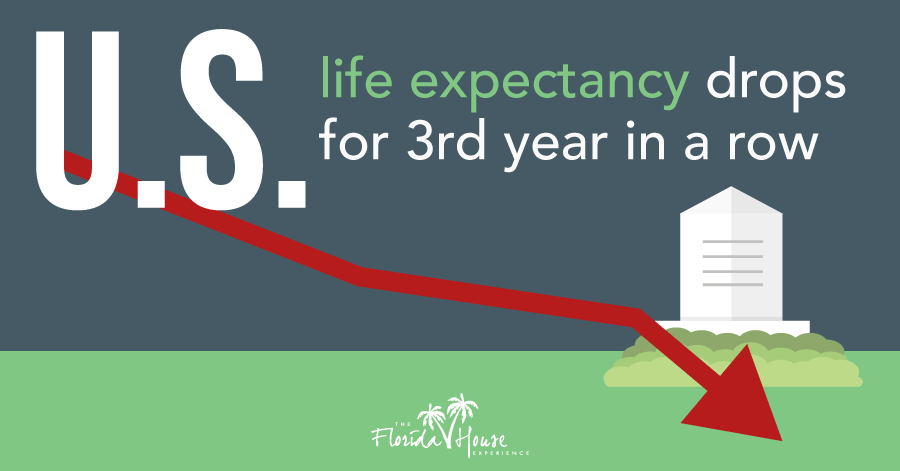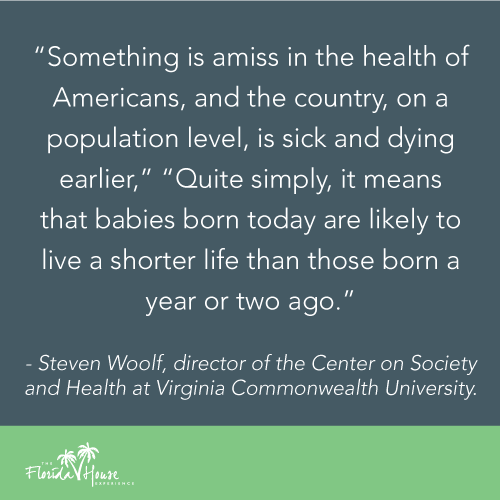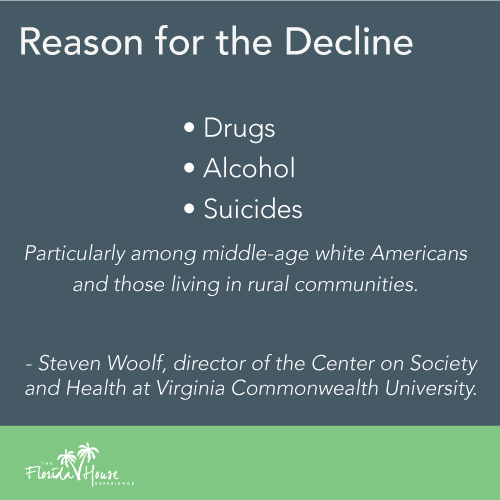
In some rather alarming news, the CDC’s National Center for Health Statistics (NCHS) reported that for the third year in a row, the U.S. saw a drop in life expectancy, meaning that the age of death of the average American is lower than it was in 2016 and even lower still than in 2015.
In this article, we’ll analyze what these numbers mean and why it’s important to reverse this troubling trend.
Why Should We Be Worried?
 A declining life expectancy defies what should be logical, which is why experts are expressing concern about this trend, reported by MSN. Every year, the health care system makes an attempt to connect more people with affordable health insurance. Each year, new, breakthrough medications are developed to treat rare diseases, offering cures for some and improving outcomes for others. These steps forward in medical management suggest that U.S. life expectancy should be rising, not falling.
A declining life expectancy defies what should be logical, which is why experts are expressing concern about this trend, reported by MSN. Every year, the health care system makes an attempt to connect more people with affordable health insurance. Each year, new, breakthrough medications are developed to treat rare diseases, offering cures for some and improving outcomes for others. These steps forward in medical management suggest that U.S. life expectancy should be rising, not falling.
It’s not surprising to find that medical outcomes are improving, as you may have suspected. A low smoking rate, new treatments and other preventive measures have caused cancer mortality rates to fall 1.7 percent from 2017 to 2018, according to the American Cancer Society. Fatal heart disease has dropped at a similar pace over the last decade as people become more aware of the lifestyle changes needed to help prevent it.
What’s so worrying about the drop in life expectancy in 2017 is that the two causes of death that have spurred this trend are some of the most disturbing from a public point of view: suicide and drug overdose.
Looking at the Numbers: Overdose Deaths
According to NIDA, overdose deaths have been one of the fastest increasing factors over the last two decades, and the numbers are alarming. In 1999, fewer than 20,000 people are recorded to have died due to a drug overdose. As of 2017, this number has increased to over 70,000. Reasons for this increase include growing access to more dangerous drugs, like fentanyl and its analogs. Often fentanyl — which is considerably stronger than most other opiates — is present in drugs without the user even knowing. The substance is strong enough to kill with just one use.
There may be a bright spot in this data, however. The CDC has reported that overdose deaths have begun to fall based on slightly premature readings of the data for 2018. After an all-time high in 2017, 2018 is projected to have fewer deaths by a number expected to be at least 1,000, suggesting that treatment and enforcement efforts are beginning to pay off.
Looking at the Numbers: Suicide
 According to MSN’s numbers, suicide deaths increased by 3.7 percent between 2016 and 2017. These numbers have been on a steady increase since efforts to record them became more prominent. For example, in 1999, suicide affected 1 out of every 14 people. Recent estimates suggest that this number has risen to 1 of every 10.5 people.
According to MSN’s numbers, suicide deaths increased by 3.7 percent between 2016 and 2017. These numbers have been on a steady increase since efforts to record them became more prominent. For example, in 1999, suicide affected 1 out of every 14 people. Recent estimates suggest that this number has risen to 1 of every 10.5 people.
According to a CDC report, only one state (Nevada) has seen a decrease in its suicide rate since 1999, and the average state saw an increase of between 19 and 30 percent.
The American Foundation for Suicide Prevention (AFSP) states that in 2017, the suicide rate had climbed to about 14 deaths per 100,000 individuals, the highest it’s been in recorded history. What’s more, the increase is consistent across most age groups, which the fastest increase exhibited in those between the ages of 15 and 24. The MSN article notes that particularly worrying is a rapid increase in suicide deaths among the population of teenage girls.
What Can We Do?
While overdose and suicide may seem like drastically different issues, they share a common factor: They’re most likely to occur in people who need help and don’t get it. FHE Health has unique, comprehensive treatment plans for people suffering from mental health issues and drug addiction in South Florida. To learn more about what we can do for you or a loved one, contact us today.






